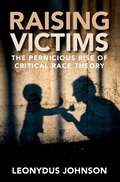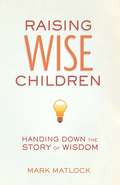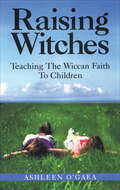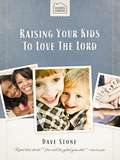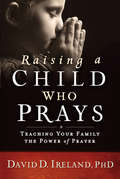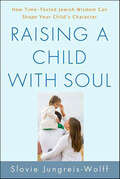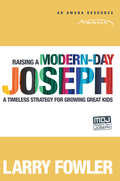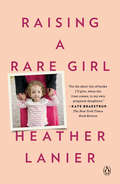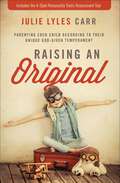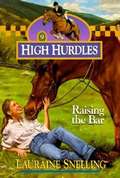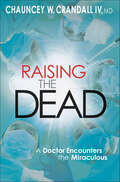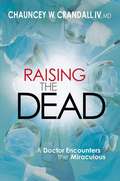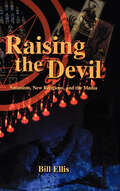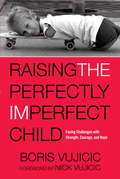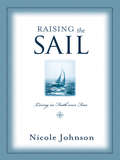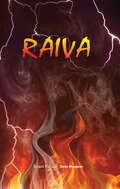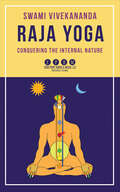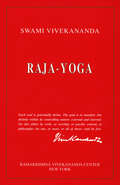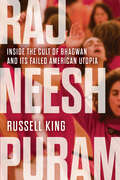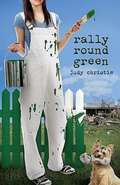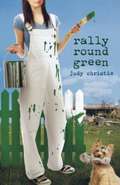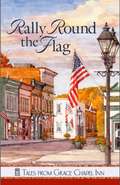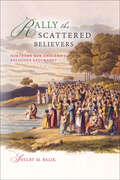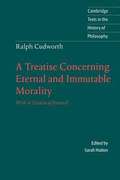- Table View
- List View
Raising Victims: The Pernicious Rise of Critical Race Theory
by Leonydus JohnsonExposes how public schools are teaching Critical Race Theory disguised as innocuous &“Diversity, Equity, and Inclusion&” initiatives, explains why this is training a generation of children to view themselves as victims, and shows parents what they can do to stop it. Public schools are indoctrinating a generation of children to see themselves as either victims of systemic racial oppression or members of a wicked oppressor class. Leonydus Johnson, a black writer and podcaster, exposes the poisonous ideology embedded in &“Diversity, Equity, and Inclusion&” programs. We must teach our children the truth that their identity comes not from their race but from Christ.
Raising Wise Children: Handing Down the Story of Wisdom
by Mark MatlockCulture expert and veteran youth pastor, Mark Matlock, will help you line your family’s story up with God’s story in the world around you, helping you raise wise children who have the character, values, and mission that allows them to go out into the real world and live out a real faith. The Raising Wise Children ebook explores such issues as: • Helping your child make decisions • The importance of failure • Knowing God’s story for your family • Changing the story your family is in • The pursuit of wisdom, and much more God has placed us here to interact with and represent him to the world by engaging with the culture—not retreating from it. Rather than trying to isolate your children from the world or draw lines that keep them from truly engaging in the world God calls us to help and heal, you can learn how to lead your family towards an integrated life where your story and God’s story come together to make a difference in the world around you.
Raising Witches: Teaching The Wiccan Faith To Children
by Ashleen O'GaeaThis is the first book that gives parents the means to teach their children Wicca in a more formal fashion. Featuring a Wiccan curriculum for each of the five age groups from infancy to young adulthood, O'Gaea shows parents how to effectively weave Wicca into a child's natural progression of learning.
Raising Your Kids to Love the Lord
by Dave StonePractical life lessons, real-life stories, and Scriptural truths for being the family that glorifies God. Raising Your Kids to Love the Lord is the first of three books in the Faithful Families series where Pastor Dave Stone applies a practical, conversational, and humorous approach to the challenge of building a strong spiritual foundation for the family. Topics include: Authenticity, Discipline, Modeling Godly Principles, Sharing the Load, and more. Preaching is his gift, but Pastor Dave Stone's family is his life's blessing. While raising three kids with his wife, Beth, as well as shepherding the diverse families of his congregation, his heart, and passion for building strong families rings louder than ever. He knows that raising faithful families is a key to the future of the church. "The world needs more people like Dave Stone. He is an astounding communicator, tremendous minister, terrific dad, and a dear friend. He writes from a wellspring of experience and character. Read this book! You will be glad you did." --Max Lucado
Raising a Child Who Prays: Teaching Your Family the Power of Prayer
by David D. IrelandIn a society that is quickly abandoning its biblical standards, parents can create an effortless culture in their home that lends itself to the spiritual development of their child. David Ireland, known for his dynamic teachings on prayer, provides a framework that helps parents elevate their prayer life, then parents can pass along the secrets to their little ones so they too may become spiritual giants over time. Parents will be equipped with practical exercises, sample prayers, and developmentally appropriate mentoring plans that will encourage their children to pray effectively now and into adulthood.
Raising a Child with Soul: How Time-Tested Jewish Wisdom Can Shape Your Child's Character
by Slovie Jungreis-WolffWith the seemingly insurmountable pressures placed on families today, many parents lack the spiritual foundation and practical knowledge to chart a clear-cut course in child-rearing. Parents question whether nurturing their children's souls is even possible in the fast-paced materialistic culture in which we live. Utilizing the insight that springs from her knowledge of Torah wisdom, her personal experiences and the experiences of those she has counseled, Slovie Jungreis-Wolff, a longtime parenting coach and advisor to young couples and families teaches in detail how to approach the entire gamut of issues, with a special emphasis on strengthening the child's morality and character. Parents will learn how to:• Instill simchas hachayim, "true joy," in their children• Value chessed, kindness, in a self-absorbed world• Create a mikdash me'at, a home filled with calm and reflection• Teach children gratitude and appreciation• And much more…From discipline to sibling rivalry to effective communication skills, Raising a Child with Soul offers unique concepts and pragmatic ideas that can be understood and applied to both Jewish and non-Jewish households.
Raising a Modern-Day Joseph
by Larry FowlerImagine this scenario for a typical teenager in your church: He's separated from his family and sent to live in a hedonistic, no-holds-barred culture. He's stripped of his spiritual support, left alone, and treated unfairly. Then, at his most vulnerable point, his ego is stoked with power and success. Throughout this rollercoaster ride, would he continue to serve God? This very test was given to the Old Testament Joseph, whose faith remained rock solid. Yet it seems that our youth are ill-equipped to face the moral vacuum in today's culture. Worse, research shows that when young people leave home, many also leave the church. So how can we forge sons and daughters of faith and fortitude? The vital answers are found in the story of Joseph. Drawing from this timeless narrative, author Larry Fowler offers a biblical plan for building teens who will love and serve Jesus Christ. Biblically based and up-to-the-minute relevant, Raising a Modern-Day Joseph is an essential guide to raising a generation that can pass life's tests with flying colors.
Raising a Rare Girl: A Memoir
by Heather LanierAward-winning writer Heather Lanier's memoir about raising a child with a rare syndrome, defying the tyranny of normal, and embracing parenthood as a spiritual practice that breaks us open in the best of ways.Like many women of her generation, Heather Lanier did everything by the book when she was expecting her first child. She ate organic foods, recited affirmations, and drew up a birth plan for an unmedicated labor in the hopes that she could create a SuperBaby, an ultra-healthy human destined for a high-achieving future. But her daughter Fiona challenged all of Lanier's preconceptions. Born with an ultra-rare syndrome known as Wolf-Hirschhorn, Fiona received a daunting prognosis: she would experience significant developmental delays and might not reach her second birthday. Not only had Lanier failed to produce a SuperBaby, she now fiercely loved a child that the world would sometimes reject. The diagnosis obliterated Lanier's perfectionist tendencies, along with her most closely held beliefs about certainty, vulnerability, God, and love. With tiny bits of mozzarella cheese, a walker rolled to library story time, a talking iPad app, and a whole lot of pop and reggae, mother and daughter spend their days doing whatever it takes to give Fiona nourishment, movement, and language. They also confront society's attitudes toward disability and the often cruel assumptions made about Fiona's worth. Lanier realizes the biggest question is not, Will my daughter walk or talk? but, How can I best love my girl, just as she is? Loving Fiona opens Lanier up to new understandings of what it means to be human, what it takes to be a mother, and above all, the aching joy and wonder that come from embracing the unique life of her rare girl.
Raising a Strong Daughter in a Toxic Culture: 11 Steps to Keep Her Happy, Healthy, and Safe
by Meg MeekerParents have never had a tougher job than now. Our culture bombards our daughters with unhealthy role models, misleads them about the consequences of early sexual activity, and even adds to the confusion of adolescences by encouraging them to question their &“gender.&” Meg Meeker has been a pediatrician for more than thirty years, is a mother and a grandmother, and has seen it all. She knows what makes for strong, happy, healthy young women—and what puts our daughters at risk. Combining that experience with her famous common sense, she explains the eleven steps that will help your daughter—whether she&’s a toddler or a troubled teen—to achieve her full human potential. In this book, you will learn:The four biggest questions every daughter has—and that you must answerWhy it's the quality, not the quantity, of your daughter's friends that mattersThe essential, complementary roles that mothers and fathers playThe dangers of social media—and how to help your daughter navigate themWhat every daughter needs to know about GodWhy depression is often a "sexually transmitted disease"How to launch your daughter into successful womanhood If you have a daughter, and worry about her future, you need Dr. Meg's advice.
Raising an Original: Parenting Each Child According to their Unique God-Given Temperament
by Julie Lyles Carr Randy PhillipsMost Christian parents are bombarded with all kinds of advice and plans and programs for how to be a great parent. In parenting eight kids over the last twenty-five years, Julie Lyles Carr and her husband experienced plenty of opportunity for learning, but it was when they began to understand it was about parenting each child according to their own unique needs and personality style that something wonderful happened. In Raising an Original, Carr helps to redefine the primary purpose of Christian parenting, this raising of the next generation. God has given each of our children specific gifts, abilities and capacities for specific purposes and He can equip parents to discover and support those powerful personality traits if they know where to look and how to respond. So many kids raised in Christian homes launch into their adult lives without any sense of knowing who they are called to be or what their mission on earth is. What if parents, teachers or mentors could help them discover the wondrous, unique threads woven within them that will enable them to see their part in the fabric of God’s universe? Readers of Raising an Original will be equipped to help their children:Understand their unique strengths and the challenges associated with themDiscover their God-given gifts and how to use them for His glorySucceed regardless of their circumstances Raising an Original will provide readers with tools for better communication with their children as well as tools for uniquely guiding and disciplining each unique child. With a helpful and detailed Personality Trait Assessment Tool included as a major part of the book, readers will understand themselves, their parenting style, and their child better. They will also discover ways to improve their children’s communication within sibling groups and with parents themselves. Readers will find freedom in discovering that God hasn’t asked them to raise perfect children; He’s asked them to uniquely raise purposed children.
Raising the Bar (High Hurdles #9)
by Lauraine SnellingWhile rescuing Herndon and other horses from a burning barn, fifteen-year-old DJ suffers serious injuries but also finds that God has answered her prayer to overcome a life-long fear of fire.
Raising the Dead: A Doctor Encounters the Miraculous
by Chauncey CrandallOn October 20, 2006, a middle-aged auto mechanic, Jeff Markin, walked into the emergency room at the Palm BeachGardensHospital and collapsed from a massive heart attack. Forty minutes later he was declared dead. After filling out his final report, the supervising cardiologist, Dr. Chauncey Crandall, started out of the room. "Before I crossed its threshold, however, I sensed God was telling me to turn around and pray for the patient," Crandall explained. With that prayer and Dr. Crandall's instruction to give the man what seemed one more useless shock from the defibrillator, Jeff Markin came back to life--and remains alive and well today. But how did a Yale-educated cardiologist whose Palm Beach practice includes some of the most powerful people in American society, including several billionaires, come to believe in supernatural healing? The answers to these questions compose a story and a spiritual journey that transformed Chauncey Crandall.
Raising the Dead: A Doctor Encounters the Miraculous
by Chauncey W. CrandallOn October 20, 2006, a middle-aged auto mechanic, Jeff Markin, walked into the emergency room at the Palm Beach Gardens Hospital and collapsed from a massive heart attack. Forty minutes later he was declared dead. After filling out his final report, the supervising cardiologist, Dr. Chauncey Crandall, started out of the room. "Before I crossed its threshold, however, I sensed God was telling me to turn around and pray for the patient," Crandall explained. With that prayer and Dr. Crandall's instruction to give the man what seemed one more useless shock from the defibrillator, Jeff Markin came back to life--and remains alive and well today. But how did a Yale-educated cardiologist whose Palm Beach practice includes some of the most powerful people in American society, including several billionaires, come to believe in supernatural healing? The answers to these questions compose a story and a spiritual journey that transformed Chauncey Crandall. Dr. Crandall wrote that ". . . the Lord said clearly to me, 'I've called you to be a physician. . . . I've given you a platform as a physician to win the lost for Christ. You will take this platform and have influence over people, wherever you go, based on your testimony.' I finally understood that many people would find my testimony credible precisely because I was a physician rather than a professional minister." Because of Dr. Crandall's encounters with the miraculous, he presently wants to heal both people's bodies and souls instead of just trying to advance himself in the medical world and earn more money like he did in the past before his remarkable metamorphosis.
Raising the Devil: Satanism, New Religions, and the Media
by Bill Ellis“Puts [the phenomena of Satanism] in the context of folklore and folk traditions . . . Highly recommended as a lucid and well-documented account.” —Library JournalRaising the Devil reveals how the Christian Pentecostal movement, right-wing conspiracy theories, and an opportunistic media turned grassroots folk traditions into the Satanism scare of the 1980s. During the mid-twentieth century, devil worship was seen as merely an isolated practice of medieval times. But by the early 1980s, many influential experts in clinical medicine and in law enforcement were proclaiming that satanic cults were widespread and dangerous. By examining the broader context for alleged “cult” activity, Bill Ellis demonstrates how the image of contemporary Satanism emerged. In some of the cases Ellis considers, common folk beliefs and rituals were misunderstood as evidence of devil worship. In others, narratives and rituals themselves were used to combat satanic forces. As the media found such stories attractive, any activity with even remotely occult overtones was demonized in order to fit a model of absolute good confronting evil.Ellis’s wide-ranging investigation covers ouija boards, cattle mutilation, graveyard desecration, and “diabolical medicine” —the psychiatric community’s version of exorcism. He offers a balanced view of contentious issues such as demonic possession, satanic ritual abuse, and the testimonies of confessing “ex-Satanists.” A trained folklorist, Ellis navigates a middle road, and his insights into informal religious traditions clarify how the image of Satanism both explained and created deviant behavior.“An interesting analysis of satanic folklore and organized anti-satanism in the US and UK.” —Choice“Shows how ancient bogeyman beliefs became aligned with politics and the criminal justice system to produce witch-hunts like the infamous McMartin Preschool case.” —Mother Jones
Raising the Perfectly Imperfect Child: Facing the Challenges with Strength, Courage, and Hope
by Nick Vujicic Boris Vujicic"You may lack limbs, but don't let that define what you can or can't do." That's the life-changing advice Boris Vujicic spoke to his son, Nick, who was born without arms or legs. With the help of his parents, Nick has become an internationally-known inspirational speaker, a best-selling author, the founder of the non-profit organization Life Without Limbs and, most importantly, a loving and responsible husband and father himself. But Nick's journey didn't start there. Raising the Perfectly Imperfect Child is the inspiring, powerfully transparent story of how two unprepared and overwhelmed parents-Boris and Dushka Vujicic-overcame their grief, fears, and badly shaken faith to raise such an accomplished, faith-filled, and perfectly imperfect son. Through their stories, Boris offers practical advice and encouragement for all parents facing a "new normal" when raising a special needs or unique child. With transparency and tenderness, he addresses the spiritual, emotional, and financial challenges, as well as offering insight on how to equip a child for happiness and success in life. Your Guide to What Special Needs Kids Need Most: Love, Roots, and Wings A Special...Rewarding Journey Told from the perspective of a humble father, who at times questioned God and his own worthiness, this book addresses the unique challenges of raising a special needs child. Facing a mountain of doubts and debt, the Vujicics feared their son would never be able to get out of bed, let alone receive an education, support himself, or have a family of his own. And they questioned how a loving Father in heaven could have allowed this to happen. Yet once they gave up their narrow expectations for the perfect child, their imperfect son taught them that there are no limits to what a determined, faith-filled, and unstoppable individual can accomplish with the help of supportive parents and a caring God. Boris candidly addresses this family's journey as Nick becomes aware of-and overcomes-the extent of his disabilities, as well as bullying, despair, and suicidal impulses. Other challenges included the stress a child with a disability put on their marriage and the need to not neglect the needs of their other children. Overflowing with inspiration and practical advice, Raising the Perfectly Imperfect Child helps everyone understand that they can find the strength to give a child what is needed, despite the challenges faced. And the results include the rewards of a satisfying and joyful spiritual life.
Raising the Sail
by Nicole JohnsonJust as sailboats are made for the wind, women are made for relationships-and with both it takes faith to overcome the fear to let go and trust God's direction. In this final book in the Faith, Hope and Love Trilogy, dramatist Nicole Johnson creates a visual reminder that God is in control. Instead of frantically paddling or "motoring" our way through the seas of our emotional connections with each other, she challenges us to freely let go and trust the "Windmaker," God Himself, to help us find our way.Nicole Johnson is no stranger to the anxiety, worry and fear that life often brings. But like a loving parent, God does not leave His children to face the closet of our fears alone. He walks beside us as our strength and guide, uncovering our fears and laying them all to rest.Raising the Sail, a 2002 Women of Faith drama sketch, illustrates the power and promise of God and fully reveals that faith in God can bring us through the darkness into a new day. A powerful antidote in a world that depletes women of the God given-confidence and assuredness to release their fears, Raising the Sail offers the stirring reminder that all things work for the good of those that love the Lord.
Raiva
by Dada BhagwanRaiva, o assunto tratado neste livro, é a mais preocupante e evidente de todas as fraquezas interiores humanas.Ela é discutida extensivamente para clara compreensão. É nossa sincera esperança que os leitores achem isto útil em seu esforço para libertar-se das severas garras da raiva.
Raja Yoga: Conquering the Internal Nature
by Swami VivekanandaSometimes known as royal yoga or sahaja marg, Raja yoga represents Swami Vivekananda's classic interpretation of Patanjali's Yoga Sutras. The author details the path of meditation and control of the mind, gives a scientific treatment of yogic philosophy, describes methods of concentration, psychic development and how to ultimately liberate the soul from the prison of the body. It remains an essential text for spiritual seekers worldwide.
Raja-Yoga
by Swami Vivekananda Swami NikhilanandaRaja-Yoga describes the methods of spiritual concentration, meditation, and psychic development.
Rajneeshpuram: Inside the Cult of Bhagwan and Its Failed American Utopia
by Russell King"Russell King has written the most definitive account of this grand American saga. Rajneeshpuram is rich storytelling." —Chapman and Maclain Way, directors of Wild Wild Country In 1981, ambitious young Ma Anand Sheela transported the Indian guru Bhagwan Shree Rajneesh to the United States to fulfill his dream of creating a utopia for his thousands of disciples. Four years later, the incendiary Rajneeshpuram commune in Oregon collapsed under the weight of audacious criminal conspiracies hatched in its inner sanctum, including the largest bioterrorism attack in US history, an unprecedented election fraud scheme, and multiple attempted murders. Rajneeshpuram explores how this extraordinary spiritual community, featured in the Netflix docuseries Wild Wild Country, went so wrong. Drawing from extensive interviews with former disciples and an exhaustive review of commune records, government and police files, and archival materials, author Russell King probes the charismatic power that Bhagwan (later known as Osho) and Sheela exercised over the community and the turbulent legal and political environment that left commune leaders ready to deceive, poison, and even murder to preserve their home and their master. Rajneeshpuram is a fresh examination of the Rajneesh story, using newly available information and interviews with high-ranking disciples who have never before shared their stories.
Rally 'Round Green
by Judy ChristieGreen survived a tornado, but now the town faces a new storm--one that threatens the schools! As Green continues to recover from a horrendous tornado, newlyweds Lois and Chris just want to return to a normal life in their home on Route Two. But even more threats to Green loom on the horizon. The state of Louisiana announces plans to close Green's schools, which will put Chris out of work and end a long-standing tradition of community pride. Lois and Chris know the loss will crush the community and harm students forced to travel more than an hour to classes. Then there's that new highway that's creeping even closer . . . But Green has another tradition: Rallying around each other. Newspaper owner Lois, Mayor Eva, and college students unite to fight the bureaucrats, with some surprising--and unexpected results. "A tender tale filled with community, friendship, and love. Judy Christie creates characters you'll want to know and places you'll want to be. Don't miss your chance to rally round with the Gang from Green!" -- Lisa Wingate, National Bestselling Author of Larkspur Cove and Dandelion Summer "Have you gone to Green yet? If not, you're missing out on all the fun. Think small southern towns are boring? Then visit Green, Louisiana and get to know Lois and Chris and their friends, families and ... animals! First, it was Gone to Green, then Goodness Gracious Green, then the Glory of Green and now it's time to Rally Round Green. Politics, potluck, storms, secrets, meth labs and remodeling, dogs and more dogs, and oh yes, chickens. Can't forget the chickens. Rally Round Green is the best Green book yet! What are you waiting for? C'mon on down to Green and find out what all the fuss is about!" -- Lenora Worth, author of Hometown Sweetheart
Rally 'Round Green (The Green Series, Book #4)
by Judy ChristieGreen survived a tornado, but now the town faces a new storm-one that threatens the schools! As Green continues to recover from a horrendous tornado, newlyweds Lois and Chris just want to return to a normal life in their home on Route Two. But even more threats to Green loom on the horizon. The state of Louisiana announces plans to close Green's schools, which will put Chris out of work and end a long-standing tradition of community pride. Lois and Chris know the loss will crush the community and harm students forced to travel more than an hour to classes. Then there's that new highway that's creeping even closer . . . But Green has another tradition: Rallying around each other. Newspaper owner Lois, Mayor Eva, and college students unite to fight the bureaucrats, with some surprising-and unexpected results.
Rally Round the Flag (Tales from Grace Chapel Inn #20)
by Jane OrcuttA group of veterans checks into the inn and teach the sisters about loyalty and sacrifice. A perfect fall read just in time for Veteran's Day. It's time to bring out the old patriotic spirit when three lively World War II vets check in at Grace Chapel Inn and march in the annual Veterans Day parade. However, another guest, Gulf War veteran Nathan Delhomme, suffers from guilt for surviving the war when his friend didn't make it. Can Alice help this troubled young man march proudly in memory of his friend? And will the Franklin High Patriots be victorious in the Thanksgiving Day football game this year? The patriotism abounds as the citizens of Acorn Hill rally 'round the flag!
Rally the Scattered Believers: Northern New England's Religious Geography
by Shelby M. Balik“An important new interpretation of how religious change shaped American cultural identity in the early republic.” —Journal of American HistoryNorthern New England, a rugged landscape dotted with transient settlements, posed challenges to the traditional town church in the wake of the American Revolution. Using the methods of spatial geography, Shelby M. Balik examines how migrants adapted their understanding of religious community and spiritual space to survive in the harsh physical surroundings of the region. The notions of boundaries, place, and identity they developed became the basis for spreading New England’s deeply rooted spiritual culture, even as it opened the way to a new evangelical age.“I strongly recommend Balik’s book for those studying colonial religious landscapes and heritages not only in New England, but in the nineteenth-century religious diasporas that swept the continent with varying mixes of European colonials and also African and Asian heritages.” —Stanley D. Brunn, University of Kentucky“In this beautifully written and richly researched work, Shelby Balik shows how the travels of early nineteenth century Methodists, Universalists and freewill Baptist itinerant missionaries and congregations recreated the geography of New England Protestantism, setting in motion (literally) a tension between religious rootedness and religious uprootedness, center and periphery, that endures to today. Early American religious history in Balik’s retelling of it is one of bodies in constant movement in and out and around the city on the hill. The delight Balik takes in maps and journeys is infectious. This is a wonderful addition to American religious historiography.” —Robert Orsi, Northwestern University
Ralph Cudworth: A Treatise Concerning Eternal And Immutable Morality - With A Treatise Of Freewill
by Karl Ameriks Desmond M. Clarke Ralph Cudworth Sarah HuttonRalph Cudworth (1617-1688) deserves recognition as one of the most important English seventeenth-century philosophers after Hobbes and Locke. In opposition to Hobbes, Cudworth proposes an innatist theory of knowledge which may be contrasted with the empirical position of his younger contemporary Locke, and in moral philosophy he anticipates the ethical rationalists of the eighteenth century. A Treatise Concerning Eternal and Immutable Morality is his most important work, and this volume makes it available, together with his shorter Treatise of Freewill, with a historical introduction, a chronology of his life, and an essay on further reading.
